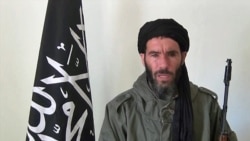A recently formed terrorist group, the al-Mulathamun Battalion, has been added to the U.S. Department of State list of Designated Foreign Terrorist Groups, pursuant to Section 219 of the Immigration and Nationality Act, and of Executive Order 13224.
The designation allows the United States to prohibit its citizens from knowingly providing material support or resources to the al-Mulathamun Battalion, or engaging in transactions on its behalf. The United States also froze the group’s property and all assets within U.S. reach, and prevent the group or anyone working on its behalf, from using financial institutions.
The al-Mulathamun Battalion, or Masked Battalion, was once a part of the terrorist group al-Qa’ida in the Islamic Maghreb, a violent militant organization which aims to overthrow the Algerian government and institute an Islamic state. In December 2012, Mokhtar Belmokhtar, a commander within al-Qa’ida in the Islamic Maghreb, formed the al-Mulathamun Battalion as his own jihadist group. He then split the Battalion away from Al-Qa’ida in the Islamic Maghreb, but continued to take direction from al-Qa’ida central leader, Ayman al-Zawahiri.
Upon separating from al-Qa’ida in the Islamic Maghreb, Belmokhtar issued a public statement in which he threatened to fight against Western interests. At the same time, he announced the creation of a sub-battalion, the al-Mua'qi'oon Biddam, or Those who Sign with Blood Brigade, reportedly made up of the organization’s best fighters. In January 2013, two months after declaring its independence, the Brigade took more than 800 people hostage at the Tigantourine gas facility in Algeria. The facility was recaptured by Algerian forces, but not before 39 hostages were executed.
In May, 2012, the al-Mulathamun Battalion cooperated with another designated extremist group, the Movement for Unity and Jihad in West Africa, orchestrating twin suicide bombings in Niger, which killed at least 20 people. Three months later, the two organizations announced that they had merged under the name al-Murabitoun, or The Sentinels.
The newly formed al-Murabitoun extremist group constitutes the greatest near-term threat to U.S. and Western interests in the Sahel. Both the “Those Who Sign in Blood” brigade and “al-Murabitoun” are included in the designation as aliases of the al-Mulathamun Battalion, and, as a result, all consequences of these designations will also apply to them.
The designation allows the United States to prohibit its citizens from knowingly providing material support or resources to the al-Mulathamun Battalion, or engaging in transactions on its behalf. The United States also froze the group’s property and all assets within U.S. reach, and prevent the group or anyone working on its behalf, from using financial institutions.
The al-Mulathamun Battalion, or Masked Battalion, was once a part of the terrorist group al-Qa’ida in the Islamic Maghreb, a violent militant organization which aims to overthrow the Algerian government and institute an Islamic state. In December 2012, Mokhtar Belmokhtar, a commander within al-Qa’ida in the Islamic Maghreb, formed the al-Mulathamun Battalion as his own jihadist group. He then split the Battalion away from Al-Qa’ida in the Islamic Maghreb, but continued to take direction from al-Qa’ida central leader, Ayman al-Zawahiri.
Upon separating from al-Qa’ida in the Islamic Maghreb, Belmokhtar issued a public statement in which he threatened to fight against Western interests. At the same time, he announced the creation of a sub-battalion, the al-Mua'qi'oon Biddam, or Those who Sign with Blood Brigade, reportedly made up of the organization’s best fighters. In January 2013, two months after declaring its independence, the Brigade took more than 800 people hostage at the Tigantourine gas facility in Algeria. The facility was recaptured by Algerian forces, but not before 39 hostages were executed.
In May, 2012, the al-Mulathamun Battalion cooperated with another designated extremist group, the Movement for Unity and Jihad in West Africa, orchestrating twin suicide bombings in Niger, which killed at least 20 people. Three months later, the two organizations announced that they had merged under the name al-Murabitoun, or The Sentinels.
The newly formed al-Murabitoun extremist group constitutes the greatest near-term threat to U.S. and Western interests in the Sahel. Both the “Those Who Sign in Blood” brigade and “al-Murabitoun” are included in the designation as aliases of the al-Mulathamun Battalion, and, as a result, all consequences of these designations will also apply to them.






